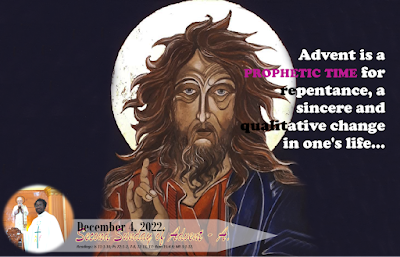THE JOY OF BRINGING CHRIST TO OTHERS.
May 31, 2023.
Feast of the Visitation of the Blessed Virgin Mary.
“For at the moment the sound of your greeting reached my
ears, the infant in my womb leaped for joy.” Lk 1:39
A Latin proverb says: “We can enjoy nothing without someone
to share the pleasure.” And a Traditional proverb adds: “Visits always give
pleasure; if not the arrival, the departure.”
We are celebrating today what we recall in the meditation of
the Holy Rosary as the second Joyful Mystery, the Visitation of Mary to her
cousin Elizabeth. The Scriptures report
that after the solemn Annunciation she received from the Archangel, Mary, newly
pregnant, traveled to be with her cousin Elizabeth, who was in her sixth to
seventh month with her son, the future John the Baptist. And we read from St.
Luke that, on Mary’s entrance to the house of Zechariah, the babe leaped in
Elizabeth's womb, and Elizabeth said the words we all know so well and repeat
in the Ave Maria: “Blessed are you among women, and blessed is the fruit of
your womb!”
We are thus celebrating today a mystery of joy. Not only the
joy between Elizabeth and Mary, but also the joy of John the Baptist
encountering Jesus, and the joy of everyone who receives the Lord. This
solemnity is a challenge for you and me to become people who bring Christ to
others, in order to share in their joy. At the heart of the mystery of the
Visitation springs the beautiful Marian canticle, the Magnificat, a
manifestation of Mary’s humility before God, an expression of her readiness to
serve her cousin Elizabeth's temporal needs, a lesson of fraternal charity, and
above all a hymn of gratitude to the Lord.
Mary calls us all, as we hear in the entrance antiphon, to
come and hear, all who fear God, what the Lord did for her. Her soul is
overwhelmed and overflowing with gratitude and eager to share it through a
service of love.
Joy, that is what we are exhorted for in the first reading.
The Prophet Zephaniah says: "Shout for joy..." And for a reason. For,
our King, the Lord is in our midst. It is the dawn of salvation and redemption.
The Lord has removed the judgment against his people. He has turned away our
enemies. All our misfortunes and reasons
for fear are taken away. No more fear, nor discouragement, no lamentations.
Let's then rejoice. For it is a time for a great festival. In the optional
first reading, St. Paul, in his address to the Romans gives the root of all
perfect and everlasting joy. It is love. When love is sincere, when people
fight and hate all kinds of evil, and when we hold on and practice what is
good, there can be nothing else but joy. We are exhorted to love one another
with mutual affection. This, the Apostle says, passes through the capacity of
rejoicing with those who rejoice weep with those who weep, and have the same
regard for one another. These are attitudes of genuine Christian life and all
bearers of Christ. And it was exactly what Mary did while visiting her cousin
Elizabeth.
Praying the Holy Rosary, about the second joyful mystery, we
speak of fraternal love as the fruit of the mystery. The Visitation of the
Blessed Virgin Mary to Elizabeth is nothing else but the expression that
fraternal love. It is love that led Mary to travel to the Hill Countries and go
to the house of Zechariah and Elizabeth. It is with love that she made herself
available to serve Elizabeth's needs. Here, Mary is depicted in a very splendid
image. She becomes the first missionary of joy, the one bearing and bringing
Jesus, the joy of the Gospel to others represented here by Elizabeth. Like
Mary, each of us is called to let ourselves be filled with the Holy Spirit and
be eager to bring Christ to all peoples of the world.
Joy is something to be shared. And more precisely, the joy
of the Gospel, the joy that springs from the Lord's coming in our humanity. In
his Apostolic Exhortation, Evangelii Gaudium, 2, Pope Francis states: "The
great danger in today’s world, pervaded as it is by consumerism, is the
desolation and anguish born of a complacent yet covetous heart, the feverish
pursuit of frivolous pleasures, and a blunted conscience. Whenever our interior
life becomes caught up in its own interests and concerns, there is no longer
room for others, no place for the poor. God’s voice is no longer heard, the
quiet joy of his love is no longer felt, and the desire to do good fades. This
is a very real danger for believers too. Many fall prey to it, and end up
resentful, angry, and listless. That is no way to live a dignified and
fulfilled life; it is not God’s will for us, nor is it the life in the Spirit
which has its source in the heart of the risen Christ."
A genuine Christian joy is shared. It is given to others, centered on others, and not on oneself. Mary is thus, the greatest example of a selfless life. Not only was she humble, but eager to serve and to praise God through loving service. All her soul, spirit, life, and being, find its joy in serving. As Christian, if you do not feel any joy in serving, and mostly in serving the needy, the marginalized, the poor, and if you are not so eager to bring Christ to others in one or other way, you still need a conversion or ask yourself what kind of Christian you are. It is time to get out from our indifference, selfish-mindset, melancholies, and reach out to others with joy, a joy that contaminates and transforms. May we be ready and eager to imitate Mary her in her humility, simplicity, spirit of service, and fraternal charity. Together, let's sing Ave Maria, and onwards in the journey of charity that alone will save the world.





Comments
Post a Comment